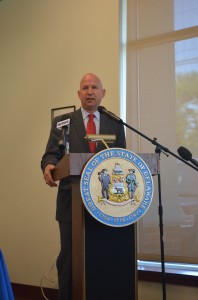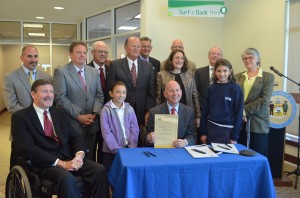-Long-term listing of museum events also included-
(DOVER, Del.—Oct. 1, 2014)—During the month of October 2014, the Zwaanendael Museum, located at 102 Kings Highway in Lewes, Del., will present two special programs focusing on different aspects of the history of Delaware’s Cape Henlopen region. Both programs are free and open to the public. For additional information, call 302-744-5055.
On Saturday, Oct. 4, 2014, from 10 a.m. to 4:30 p.m., the museum will present the program “His Majesty’s Sloop of War DeBraak,” a day-long slate of maritime-history and -archaeology activities held in conjunction with Lewes’ annual Boast the Coast maritime festival. Among others, museum activities will include block-and-tackle demonstrations and a 2 p.m. presentation on the wreck of the DeBraak, a British warship that was escorting and protecting a convoy of British and American merchant ships en route to the United States when it was capsized and lost off Cape Henlopen on May 25, 1798. The remains of the ship’s hull and associated artifact collection have been curated by the Delaware Division of Historical and Cultural Affairs since they were acquired by state of Delaware in 1992.
On Saturday, Oct. 25, 2014, the museum will present a walking tour that explores the unusual tombstones of St. Peter’s Episcopal Church cemetery in Lewes. Held in the spirit of the Halloween season, the tour, entitled Mysteries of History,” will depart from the Zwaanendael Museum at 2 p.m.
The Zwaanendael Museum was built in 1931 to commemorate the 300th anniversary of the state’s first European colony, Swanendael, established by the Dutch along Hoorn Kill (present-day Lewes-Rehoboth Canal) in 1631. Designed by E. William Martin (architect of Legislative Hall and the Hall of Records in Dover), the museum is modeled after the town hall in Hoorn, the Netherlands, and features a stepped facade gable with carved stonework and decorated shutters.
Zwaanendael Museum exhibits and presentations provide a showcase for Lewes-area maritime, military and social history. Current exhibits include “A Seaborne Citizenry: The DeBraak and Its Atlantic World” which tells the DeBraak story, and “Delaware and the War of 1812” which examines the service and sacrifice of Delawareans of 1812 to 1815, and the important role that the state played in a conflict that helped shape the development of the United States as a nation.
Following is a long-term schedule of Zwaanendael-Museum-sponsored special events. Unless otherwise noted, all programs take place at the Zwaanendael Museum located at 102 Kings Highway in Lewes, Del. Museum hours from April 1 to Oct. 31 are Tuesday through Saturday, 10 a.m. to 4:30 p.m.; and Sunday, 1:30 to 4:30 p.m. From Nov. 1 to March 31, museum hours are Wednesday through Saturday, 10 a.m. to 4:30 p.m. Admission is free for all events listed. For additional information, call 302-645-1148.
Saturday, Oct. 4, 2014
“His Majesty’s Sloop of War DeBraak.” Held in conjunction with Lewes’ annual Boast the Coast festival, the event will feature a day-long slate of maritime-history and -archaeology activities including block-and-tackle demonstrations and a 2 p.m. presentation on the DeBraak shipwreck. 10 a.m.–4:30 p.m.
Saturday, Oct. 25, 2014
“Mysteries of History.” Walking tour explores the unusual tombstones of St. Peter’s cemetery in Lewes. Tour leaves from the museum at 2 p.m.
Saturday, Nov. 8, 2014
“Delaware’s Decades—the 1970s: ‘Coastal Zone Act of 1971.’ ” Lecture by Kevin Coyle, principal planner for the Delaware Department of Natural Resources and Environmental Control, on the landmark state-legislation that limited industrial development in Delaware’s coastal areas. Part five of an eight-part series exploring decades in Delaware’s history. 2 p.m. Free admission but, due to space restrictions, reservations are required by calling 302-645-1148 no later than Nov. 6, 2014.
Saturday, Nov. 15, 2014
Dutch-American Heritage Day. Learn about the contributions that the Dutch have made to the economic, social, political and cultural life of Delaware and the United States. Program will include a lecture by Delaware Division of Historical and Cultural Affairs archaeologist Craig Lukezic. 2 p.m.
Thursday, Dec. 4, 2014
“Hospitality Night.” 1920s holiday-themed program featuring festive décor, music, demonstrations and seasonal refreshments. 6–9 p.m.
Saturday, Dec. 6, 2014
“Tour Zwaanendael Museum.” Enjoy the museum’s festive holiday-décor. Event held in conjunction with the Lewes Historical Society’s Christmas Tour of Lewes. 10 a.m.–4 p.m.
Saturday, Jan. 17, 2015
“Delaware’s Decades—the 1980s: ‘Salvage of His Majesty’s Sloop DeBraak.’ ” Lecture by Claudia Leister, executive director of the Milford Museum. Part six of an eight-part series exploring decades in Delaware’s history. 2 p.m. Free admission but, due to space restrictions, reservations are required by calling 302-645-1148 no later than Jan. 5, 2015.
Saturday, Feb. 14, 2015
“Delaware’s Decades—the 1990s.” Program description TBA. Part seven of an eight-part series exploring decades in Delaware’s history. 2 p.m.Free admission but, due to space restrictions, reservations are required by calling 302-645-1148 no later than Feb.2, 2015.
Saturday, March 14, 2015
Delaware’s Decades—the 2000s. Lecture by Bill Ayrey, lab manager and company historian from ILC Dover, who will discuss the future of space travel and space suits from the early 2000s to the present. Eighth and final installment of a series exploring decades in Delaware’s history. 2 p.m. Free admission but, due to space restrictions, reservations are required by calling 302-645-1148 no later than March 2, 2015.
Thursday–Saturday, April 9–11, 2015
Lewes Tulip Festival. City-wide series of activities celebrating Lewes’ Dutch heritage including Dutch games, crafts and a display of Delftware ceramics at the Zwaanendael Museum. Sponsored by the Lewes Chamber of Commerce. Downtown Lewes. 10 a.m.–4 p.m. 302-645-8073.
Saturday, April 18, 2015
Dutch-American Friendship Day. Discover Delaware’s Dutch roots and learn how that connection is alive today.10 a.m.–4:30 p.m.
Saturday, April 25, 2015
King’s Day. Celebration of the birthday of King Willem-Alexander of the Netherlands in a program that will also explore royal titles and Delaware’s Dutch connection. 10 a.m.–4:30 p.m.
-End-
Contact:
Jim Yurasek
Delaware Division of Historical and Cultural Affairs
Phone: 302-736-7413
E-mail: Jim.Yurasek@delaware.gov
Web: http://history.delaware.gov


